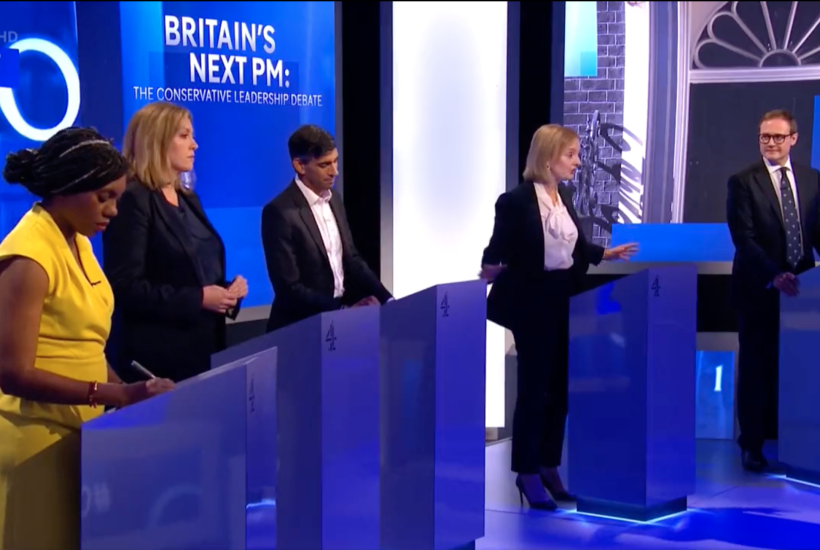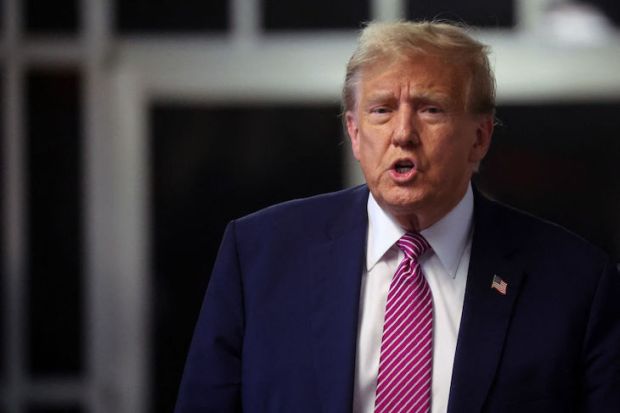You’ve probably heard the joke about the two hikers facing an angry bear. One changes into his running shoes, telling his confused friend: ‘I don’t need to outrun the bear, I just need to outrun you.’
The gag captures the importance of differentiating between the relative and the absolute. Knowing that a tree is taller than the other trees in the forest doesn’t tell you how tall that tree is – or how big the forest is. Learning that a company is more profitable than others in its market doesn’t tell you if that company is actually doing well – they could all be failing.
This is largely how I view the first prime ministerial candidates’ debate on Channel Four on the key issue of the day: energy bills and the cost of living. None of them won. None of them have an answer good enough or big enough to meet the scale of the financial and political crisis the country is just starting to hit.
I say this as a friend of Tom Tugendhat whose performance vindicated my prediction earlier this week that the more the country sees of him, the more voters would like him. I told you so, etc etc.
But doing better than the other four candidates on the stage is relative success. Almost all the analysis and commentary about those candidates’ performance will be about the trees, not the wood.
That’s right and proper, of course. The identity of our next prime minister depends on whose results and answers are relatively better than those of their rivals. One of them just needs to outrun the bear that is the Tory membership while it mauls the other four, and the prize is theirs.
But – to torture this metaphor until it weeps – there are bigger beasts in this forest than 100,000-odd Tory members. Twenty-five million households facing energy bills of more than £3,200 a year, for instance. Every consumer group, every energy company and expert, every pollster I know says the same on this: those bills mean a storm is coming.
And on the showing of the debate, and the leadership contest as a whole so far, none of the candidates looks like they’ve fully grasped the scale of anxiety and hardship those bills are causing and will cause. Channel Four and its studio audience caused them all to talk more about this issue in one debate than they have in the rest of the campaign combined.
For that, the candidates should all be grateful, because they all need better answers. Obviously I’m biased, but I think Tugendhat did OK, especially when he talked about the need for greater energy efficiency measures: lagging is often regarded as politically boring, but something that can cut hundreds of pounds off energy bills should be exciting.
Rishi Sunak talked about energy efficiency too, which was good. He also came close to warning the public about the limits of what any government can do in the face of rocketing wholesale gas prices: I suspect that grown-up candour was a big part of his strong showing in post-debate polls. I shan’t say anything about the others, because, well, if you can’t say anything nice, it’s polite to say nothing at all. (But did Truss really say the answer to a cost-of-living crisis driven by high gas prices is ‘more gas energy’? Really?)
Anyway, the cost-of-living story of the debate wasn’t what the candidates said about prices and energy bills. It was the stony faces of the audience watching them. It was Krishnan Guru-Murthy’s razor-edged incredulity that none of them could promise any new help worth more than the £150 Liz Truss said she’d conjure up by getting rid of tariffs that, er, pay for energy efficiency measures that reduce energy bills (David Cameron tried this genius move once. It added more than £2 billion to bills).
No doubt some Tories will shrug off those responses in the dreamy hope that a leftie Channel Four audience isn’t representative of the wider public. But my bet is that the grim-faced debate attendees last night are closer to the national mood than some people involved in the Tory leadership race.
Last night, some candidates did well and some did badly. But those triumphs and disasters were relative, not absolute. Whoever wins is going to take office at the start of an autumn that threatens to bring an absolute financial crisis for many people, and absolute political torment for government.
Got something to add? Join the discussion and comment below.
Get 10 issues for just $10
Subscribe to The Spectator Australia today for the next 10 magazine issues, plus full online access, for just $10.




















Comments
Don't miss out
Join the conversation with other Spectator Australia readers. Subscribe to leave a comment.
SUBSCRIBEAlready a subscriber? Log in